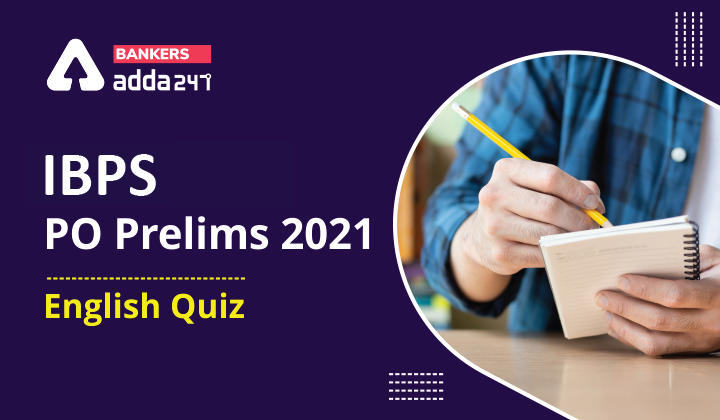
TOPIC: Miscellaneous
Directions (1-10): Read the following passage carefully and answer the questions given
below it. Certain words are given in bold to help you locate them while
answering some of the questions.
IT is a truth that should now be
universally acknowledged, that everywhere in the world our lives are driven by
computers—or more specifically by the workings of information and communication
technology (ICT) and, therefore, the Internet. Our dependence on them is not
just temporary or partial; it is continuous and overwhelming. People who
actively use computers—desktops, laptops, tablets or mobile telephones—are not
the only ones whose lives are driven by them and by Internet access.
Increasingly, certainly in urban areas, almost all forms of transport, most
forms of financial transactions and many forms of quotidian work and interaction are reliant on the underlying
operations of computer systems. As “the Internet of things” quietly becomes
more and more significant, the very gadgets that people use on a regular basis
function on the basis of information collected, computed and transmitted in
ways that are typically not even known to or grasped by the user.
All this has created new forms of
dependency and vulnerability, which we do not fully recognize. The usual
concerns that many people have about this domination of “smart” machines all
around us relate to privacy, monitoring and surveillance, and, of course, the ever-present
possibility of cyber fraud. These are certainly valid concerns. But the
implications of a simple failure of a computer system—and outage or
downtime—are somehow seen as less dire, probably because most people believe
that such temporary collapses can be speedily rectified and dealt with, and
that most computer systems have enough backup to resolve the ensuing problems quickly and relatively
smoothly, without major disruption.
However, now it seems that such a belief
in the fundamental resilience (if
such a word can be used) and reliability of systems based in cyberspace are not
justified and could even be touchingly naive. The latest example of the
fragility of these systems was the collapse of the computer system of British
Airways on May 27, which led to a complete shutdown of flights for a full day
followed by huge numbers of cancellations and delays and chaos and confusion
for several days thereafter.
According to British Airways, the
computer system broke down because of a “power failure”—but surely that raises
more questions than it answers. How could an international airline as large and
established as British Airways not have a system of uninterrupted power supply,
which is something even private individuals seek to ensure when they are dealing
with data? Surely it would have had multiple servers in different locations?
What about adequate backup, including on the “cloud”, which must be the most
obvious item on any computer system checklist? And was there no system in place
to deal with such emergency contingencies to minimise their adverse effects?
If none of this was apparently in place
for British Airways, people would be justified in feeling concerned about many
other computer systems that are assumed to have adequate protection, backup and
contingency planning. What about
banks, for example, and credit card companies that have apparently experienced
various nightmarish hacks and other cyber threats that are intentionally played
down by the media to prevent panic? What about military systems, which are
increasingly reliant on software and computer programmes, which we do not lose
sleep over because we assume that sufficient precautions have been taken to
cover all possible contingencies, even unexpected ones?
Q1. How according to the author
Information and Communication Technology has revolutionized the lives of
people?
(I)People have become more dependent on
electronic gadgets as they find them the most significant tool to access
information related to any topic.
(II)There is an upsurge in the use of
technology in urban areas as almost all forms of transport, most forms of
financial transactions and many forms of quotidian work and interaction are
reliant on the underlying operations of computer systems.
(III)There is an active utilization of
the facilities being provided through various mediums like computer, tablet,
internet and other electronic equipments transmitting immense relevant data for
day-to-day use.
(a)Only (I) is correct
(b)Only (II) is correct
(c)Both (I) and (II) are correct
(d)Both (II) and (III) are correct
(e)All are correct
Q2. What does author mean by new forms
of dependency and vulnerability related to the domination of IT products?
(I)There is a serious concern regarding
the misuse of gadgets for some illegal activities.
(II)There is a rising concern related to
privacy, monitoring and surveillance of smart products of IT.
(III)The possibility of cyber-fraud is
one of the biggest concerns that has kept challenging the domination of IT
products.
(a)Only (I) is correct
(b)Only (II) is correct
(c)Only (III) is correct
(d)Both (II) and (III) are correct
(e)All are correct
Q3. Which of the following statements in
context of the passage show(s) that the author is skeptical?
(a)Simple human errors have been
responsible for sudden breakdowns of smart machines, so far with less adverse
impact.
(b)There is a speedy rectification of
cyber related problems as these products have the implications of quick self
recovery.
(c)Any temporary collapse of computer
system can be easily dealt with as they have enough backup to resolve the
ensuing problems quickly and relatively smoothly, without major disruption.
(d)The reliability of systems based in
cyberspace and its fundamental feature of flexibility are difficult to justify.
(e)Both (c) and (d)
Q4. What does author mean by the phrase
“but surely that raises more questions
than it answers”?
(I)The reason cited by the British
Airways for the breakdown of computer system is difficult to digest as it
raises further questions related to its security and privacy concerns.
(II)Being such a large and established
airline, the reason of power failure shows the extent of casual approach of
British Airways.
(III)The reason of power failure mask
the errors of the concerned authority as it raises many questions related to
back up plans.
(a)Only (I) is correct
(b)Both (I) and (III) are correct
(c)Both (I) and (II) are correct
(d)Both (II) and (III) are correct
(e)All are correct
Q5. What does author mean by the
statement, “Our dependence on them is
not just temporary or partial; it is continuous and overwhelming” as used
in the passage?
(a)People have become more reliant on
technology and its ever increasing popularity and utilization has made it the
most reliable source of existence in coming future.
(b)The growing dependence on IT sector
shows that with this rate it is going to surpass all other existing markets in
near future.
(c)There is no partial dependency on
Information and Technology as people have accepted their all products gleefully
without making any future compromise.
(d)The over utilization of IT products
shows that our dependency on these products is not temporary rather it has
become a perpetual necessity.
(e)All are true.
Q6. Which of the following set of words
describe the mood and style of writing of the author respectively in writing
the passage?
(a)Hopeful, Descriptive
(b)Confining, Persuasive
(c)Alarming, Expository
(d)Ominous, Narrative
(e)Oppressive, Informative
Direction
(7-8): Choose the word/group of words which is most similar in meaning to the word/group
of words printed in bold as used in passage.
Q7. Ensue
(a)Stumble
(b)Chance
(c)Retreat
(d)Supervene
(e)Denounce
Q8. Contingency
(a)Openness
(b)Fortuity
(c)Compromise
(d)Menace
(e)Revelation
Direction (9-10):
Choose the word/group of words which is most opposite in meaning to the word/group
of words printed in bold as used in passage.
Q9. Quotidian
(a)Mainstream
(b)Unmemorable
(c)Unusual
(d)Colorless
(e)Uneventful
Q10. Resilience
(a)Plasticity
(b)Compliance
(c)Suppleness
(d)Tolerance
(e)Fragility
Directions
(11-15): Rearrange the following sentences (A), (B),
(C), (D) and (E) in the proper sequence to form a meaningful paragraph and then
answer the questions given below it.
A. Neither cinema
nor the press are separately listed in the Constitution, though they are derived
from Article 19 (1)A, which lists the freedom of speech and expression.
B. The issue of
censorship comes up when we debate whether there should be restrictions to
freedom of expression.
C. India is a very
vast and complex country and the same freedom enshrined in the Constitution
applies to cinema as well.
D. And the answer is
that a total censorship and absolute freedom can both be problematic.
E. Citizens of the
country as complex as ours have varying needs, requirements and sensibilities
and one has to strike a balance.
Q11. Which of the following would be the THIRD sentence after rearrangement?
(a) A (b)
B (c) C (d) D (e) E
Q12. Which of the following would be the FIRST sentence after rearrangement?
(a) D (b)
C (c) A (d) B (e)
E
Q13. Which of the following would be the FOURTH sentence after rearrangement?
(a) C (b)
D (c) A (d) E (e)
B
Q14. Which of the following would be the SECOND sentence after rearrangement?
(a) E (b)
D (c) A (d) C (e)
B
Q15. Which of the following would be the FIFTH (LAST) sentence after
rearrangement?
(a) E (b)
A (c) B (d) D (e) C
ALSO CHECK:
- For more English quizzes
- SBI/IBPS PO प्रीलिम्स स्टडी प्लान 2021, डेली प्रैक्टिस से इम्प्रूव करें अपनी स्पीड और एक्यूरेसी
SOLUTIONS:
S1. Ans. (e)
Sol. Read the first paragraph carefully,
it can be easily inferred from there that in today’s world, Information and
Communication Technology has completely changed the lives of people around the
world. All three statements can be easily verified from the first paragraph.
Hence (e) is the correct choice.
S2. Ans. (d)
Sol. Refer the second paragraph, “The
usual concerns that many people have about this domination of “smart” machines
all around us relate to privacy, monitoring and surveillance, and, of course,
the ever-present possibility of cyber fraud.” Hence both the statements (II)
and (III) are correct in context of the passage.
S3. Ans. (e)
Sol. Refer the last sentence of the
second paragraph, “…most people believe that such temporary collapses can be
speedily rectified and dealt with, and that most computer systems have enough
backup to resolve the ensuing problems quickly and relatively smoothly, without
major disruption.” and the first sentence of the third paragraph, “…now it
seems that such a belief in the fundamental resilience (if such a word can be
used) and reliability of systems based in cyberspace are not justified and
could even be touchingly naive.” These two statements have nicely been
justified with the example of power failure of British Airways. Hence both
these statements show that the author is skeptical about the reliability and
truth related to such issues.
S4. Ans. (b)
Sol. Read the fourth paragraph
carefully, it is clearly mentioned there that the reason of power failure for
the breakdown of computer system raises more questions related to its existing
back up plans, security, privacy and problem solving measures. Hence in context
of the passage, both the statements (I) and (III) are correct.
S5. Ans. (a)
Sol. Refer the first paragraph of the
passage carefully, “IT is a truth that should now be universally acknowledged,
that everywhere in the world our lives are driven by computers—or more
specifically by the workings of information and communication technology (ICT)
and, therefore, the Internet. Our dependence on them is not just temporary or
partial; it is continuous and overwhelming.” Hence it can be inferred from the
passage that only option (a) defines the hidden meaning behind statement used
by the author in a better way.
S6. Ans. (c)
Sol. It can be easily understood from
the passage that the author has tried to alarm against the excess use of
technology and the security concerns related to the same. Moreover, the author
has tried to come up with subject-oriented style of writing with an intention
to explain and describe about the dependency of people on IT sector. Hence
“alarming, expository” is the correct set of words which describe the mood and
writing style of the author respectively.
S7. Ans. (d)
Sol. Ensue means happen or occur afterwards or as a result. Supervene means occur as an
interruption or change to an existing situation. Hence both are almost similar
in meanings.
Denounce means publicly declare to be wrong or evil.
S8. Ans. (b)
Sol. Contingency means a future event or circumstance which is possible
but cannot be predicted with certainty. Fortuity
means a chance occurrence. Hence both are similar in meanings.
Menace means a person or thing that is likely to cause harm; a threat or
danger.
S9. Ans. (c)
Sol. Quotidian means ordinary or everyday; mundane. So “unusual” is the word most opposite in
meaning to it.
S10. Ans. (e)
Sol. Resilience means the capacity to recover quickly from difficulties;
toughness. So “fragility” is the
word most opposite in meaning to it.
Compliance means the action or fact of complying with a wish or command.
Suppleness means pliant; flexible.
For questions (11-15):
The correct sequence is CABDE
S11. Ans.(b)
S12. Ans.(b)
S13. Ans.(b)
S14. Ans.(c)
S15. Ans.(a)
Click Here to Register for Bank Exams 2021 Preparation Material



 English Quizzes For SBI PO Mains 2023 - ...
English Quizzes For SBI PO Mains 2023 - ...

